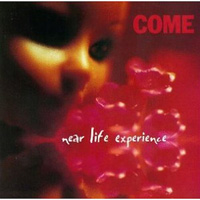

Near Life Experience (Matador)
by Nik Rainey
The blues had a baby that it doesn’t like to claim, a mewling little monster child with its skin turned inside out and its heart beating on the outside. To everyone’s surprise, it grew, met up with a punk called Punk, and after a series of inebriated clinches, produced a gaggle of ugly, shambling, but somehow compelling rugrats. You’ve probably seen a few of them around, perverse little devil dogs with names like Royal Trux, the Gun Club (R.I.P.), and some skinny guy with a theremin named Spencer.
One of these bastards has even turned up on our own doorstep, a rough beast which answers to the name Come. Their name always struck me as somewhat ironic – the clenched guitar interplay and gnarled sound of their previous releases (Eleven: Eleven [1992] and Don’t Ask Don’t Tell [1994], also on Matador) offered little in the way of release – but Near Life Experience, with its ever-so-slight concessions to accessibility and more manageable 32-minute lifespan, proves more in line with the other (cleaner) definition of the word. It beckons, it coerces with a touch of familiarity (“Hurricane,” the lead track, literally takes up where the Beatles’ “I Want You (She’s So Heavy)” leaves off), then strands you, a prisoner of sound.
This is one blues-inf(l)ected group that doesn’t need to go down to the crossroads – Hell is all around them already. With most of the old lineup gone (replaced by members of Rodan, the Jesus Lizard, and Kustomized, among others), it’s been left to guitarist/vocalists Thalia Zedek and Chris Brokaw to keep the fire stoked, and, true to form, they leave no hair unsinged. Zedek especially – I’ve been in thrall of her two-cartons-a-day grate since she transformed Live Skull from a mediocre Sonic Youth-influenced Lower East Side noise band into an exemplary Sonic Youth-influenced Lower East Side noise band in the late ’80s, and she imbues even the slower, prettier “Sloe-Eyed” with a subtle undercurrent of emotional vertigo, like a lullaby for a night when you know you’ll never get to sleep. This feral blooze-baby may be a trifle more domesticated than before, but I still don’t think we should turn our backs on it or leave it unsupervised.